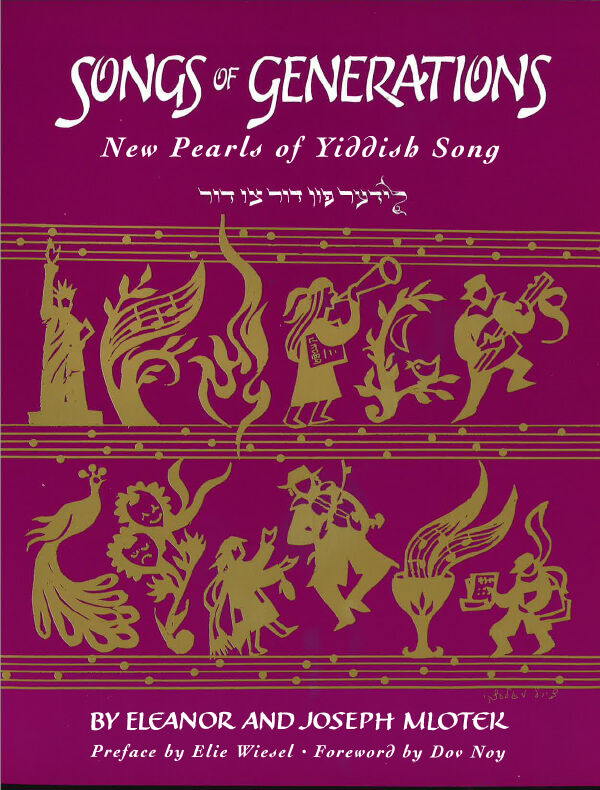Part of a song based on the poem “Di mashin” by the “poet of the sweatshop” Morris Rosenfeld (1862-1923). The song has two melodies, both of which are presented here. One was published in the collection of I. Glatstein, Di fraye muze, 1918. The second melody was sung to compilers by the late singer David Carrey (1942-1985). R. Pups writes that the poem was adapted in the Lodz Ghetto: “Es roysht azoy vild in resort di mashin” (The machine roars so wildly in the ghetto factory).

The machines in the shop make such a wild noise
that in the noise, I often forget I exist;
I get lost in the terrible clamor,
and feel I amount to nothing, I’m becoming a machine.
I work and work, I work beyond reckoning,
production, and production, and endless production;
Why? For whom? I don’t know and I don’t ask.
Where does a machine get off thinking?
Not a feeling, not a thought, no understanding, even.
The bitter, bloody work beats down
the most noble, the finest, the best and the richest,
the most profound and the most exalted things that life offers.
Seconds, minutes and hours disappear.
On swift wings, the nights fly by along with the days.
I drive the machine as if I am trying to catch up with it,
chasing it senselessly, chasing it endlessly.
Es royshn in shap azoy vild di mashinen,
Az oft mol farges ikh in roysh az ikh bin; —
lkh ver in dem shreklekhn tuml farlorn,
Mayn ikh vert dort botl, ikh ver a mashin.
lkh arbet un arbet, un arbet on kheshbn,
Es shaft zikh, un shaft zikh, un shaft zikh on tsol;
Far vos un far vemen? lkh veys nit, ikh freg nit, —
Vi kumt a mashine tsu denken a mol?
Nito keyn gefil, keyn gedank, keyn farshtand gor; —
Di bitere, blutike arbet dershlogt
Dos eydlste, shenste un beste, dos raykhste,
Dos tifste, dos hekhste vos lebn farmogt;
Es shvindn sekundn, minutn un shtundn
Gor zegl-shnel flien di nekht mit di teg;
lkh trayb di mashin glaykh ikh vil zey deryogn, —
lkh yog on a seykhl, ikh yog on a breg.
עס רױשן אין שאַפּ אַזױ װילד די מאַשינען,
אַז אָפֿט מאָל פֿאַרגעס איך אין רױש אַז איך בין; —
איך װער אין דעם שרעקלעכן טומל פֿאַרלאָרן,
מײַן איך װערט דאָרט בטל, איך װער אַ מאַשין.
איך אַרבעט און אַרבעט, און אַרבעט אָן חשבון,
עס שאַפֿט זיך, און שאַפֿט זיך, און שאַפֿט זיך אָן צאָל;
פֿאַר װאָס און פֿאַר װעמען? איך װײס ניט, איך פֿרעג ניט —
װי קומט אַ מאַשינע צו דענקען אַ מאָל?
ניטאָ קײן געפֿיל, קײן געדאַנק, קײן פֿאַרשטאַנד גאָר; —
די ביטערע, בלוטיקע אַרבעט דערשלאָגט
דאָס אײדלסטע, שענסטע און בעסטע, דאָס רײַכסטע,
דאָס טיפֿסטע, דאָס העכסטע װאָס לעבן פֿאַרמאָגט;
עס שװינדן סעקונדן, מינוטן און שטונדן
גאָר זעגל-שנעל פֿליִען די נעכט מיט די טעג;
איך טרײַב די מאַשין גלײַך איך װיל זײ דעריאָגן, —
איך יאָג אָן אַ שׂכל, איך יאָג אָן א ברעג.
Song Title: Di Svet-shap

The Songs of Generations: New Pearls of Yiddish Song anthology comprises songs that were either never printed before or appeared in rare and inaccessible publications — sometimes in different versions and without proper sources. Most of the songs in this book were submitted by readers of Chana and Yosl’s column “Perl fun der yidisher poezye” (Pearls of Yiddish Poetry) in the Yiddish newspaper Der Forverts (The Forward), initiated in October, 1970. Over 25 years, thousands of songs were collected in correspondence and on cassettes from readers throughout the world, and they represent a veritable national Yiddish song archive. Chana Mlotek, in her introduction, writes, “In the course of years the inquiries, contributions and enthusiasm of these readers have kept our own interest unflagging and have reinforced our dedication to this effort. And in recent years our participants have also been augmented by new readers from the former Soviet Russia, who receive our newspaper there or from newly-arrived immigrants in this country and Israel.”